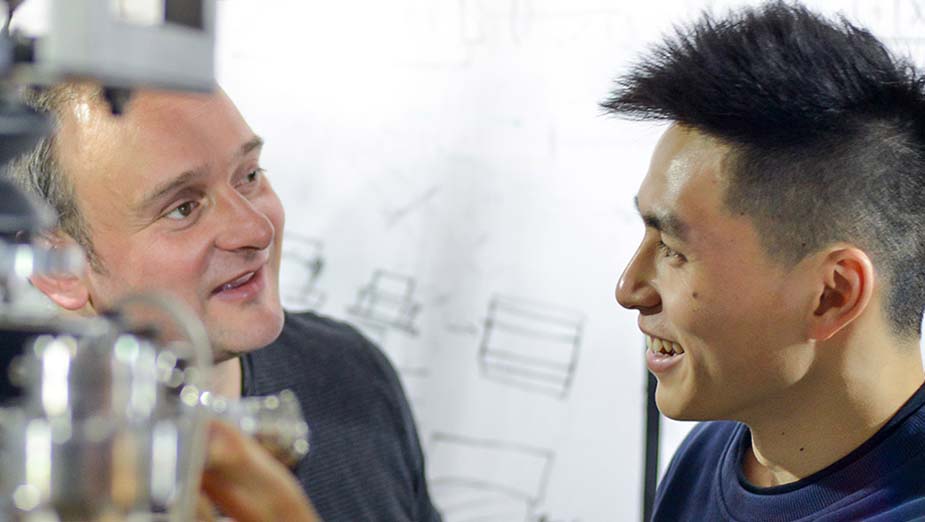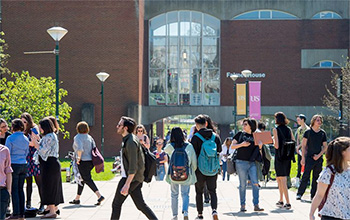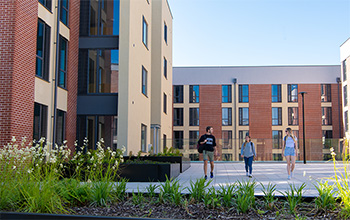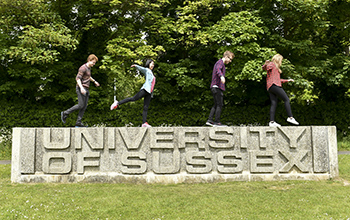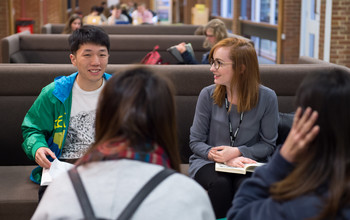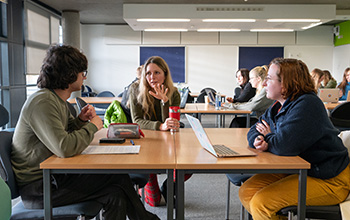Key information
Duration
4 years full time
Typical A-level offer
AAA
UCAS code
F321
Start date
September 2027
Location
Why choose this course at Sussex?
Quantum technology has the power to transform the way we live and work. This exciting and rapidly growing field could help solve global issues – from making powerful medicines, understanding chemical reactions, creating better batteries and materials, to reducing our carbon footprint, and beyond.
Exploring the fascinating world of quantum technology, you'll gain a broad understanding of the core principles of physics. You'll develop analytical, experimental, and computational expertise. Throughout your studies, you’ll:
- use the latest equipment and state-of-the-art laboratories
- gain a broad range of skills in theoretical and experimental physics
- develop specialist knowledge in quantum technologies
- learn to apply your knowledge and skills in real-world applications and in industry
- benefit from our strong links with industry and international collaborators.
At Sussex, you’ll learn from world-leading researchers and key influencers in industry. Our research informs your modules. From quantum computers to quantum sensors, and from atomic clocks to the quantum internet, this degree helps you understand and develop a whole new generation of technologies.
You’ll benefit from the expertise in the Sussex Centre for Quantum Technologies. You’ll join one of our quantum technology research groups as part of your final-year project.
Your broad training in physics equips you for a wide range of careers, while your specialisation in quantum technology will allow you to join the quantum technology sector. On graduation, you’ll have developed skills much in demand with employers, including problem-solving, data analysis, technical knowledge and research. Your training will open doors to exciting careers in:
- the quantum technology sector
- researchfinance
- industry.
- =1st in the world for research impact in Physics (Shanghai Ranking Global Ranking of Academic Subjects 2025)
- 7th in the UK for our research environment in Physics in REF 2021 (Times Higher Education)
- =20th in the UK for Physics (QS World University Rankings by Subject 2025)
Undergraduate Visit Days
Learn more about your chosen course, explore our distinctive campus, and meet our staff and students.
Book a Visit Day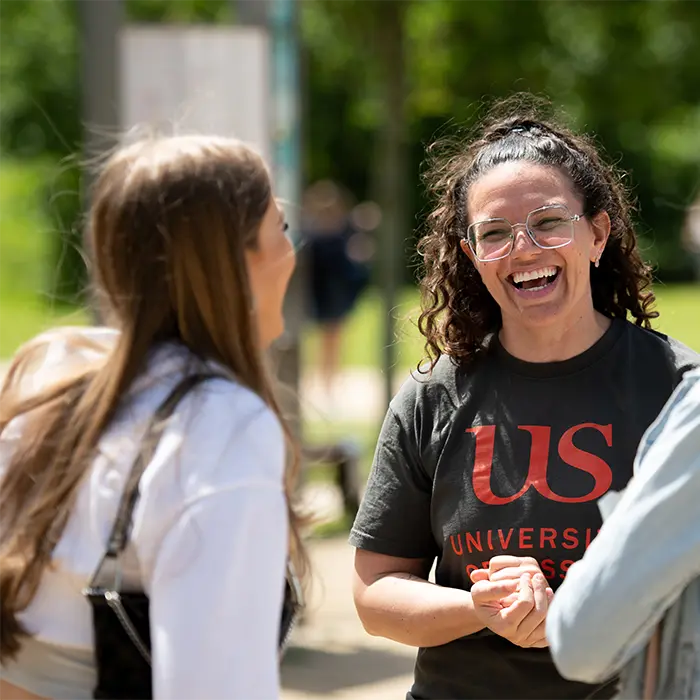
On campus - in person
You’ll study for this degree on our campus, joining our academics and fellow students. With in-person contact time, digitally supported educational resources, library collections and independent study, this course is designed to give you an inclusive education. Your learning experience may also include work placements, field trips, studying abroad and internationalisation experiences.
Find out about our beautiful campus
Take our virtual tour
Be inspired by our beautiful campus and buzzing Brighton in this immersive 360° experience.
Begin your tour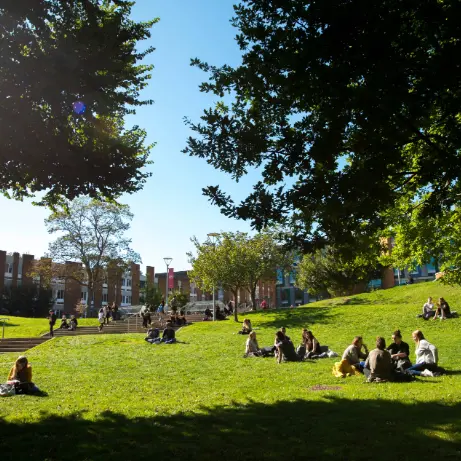
As a founding partner of ResearchPlus, a collaboration of research-focused universities, we engage with government, industry and civil society to support economic growth, prosperity and wellbeing across the whole of the UK.
Find out more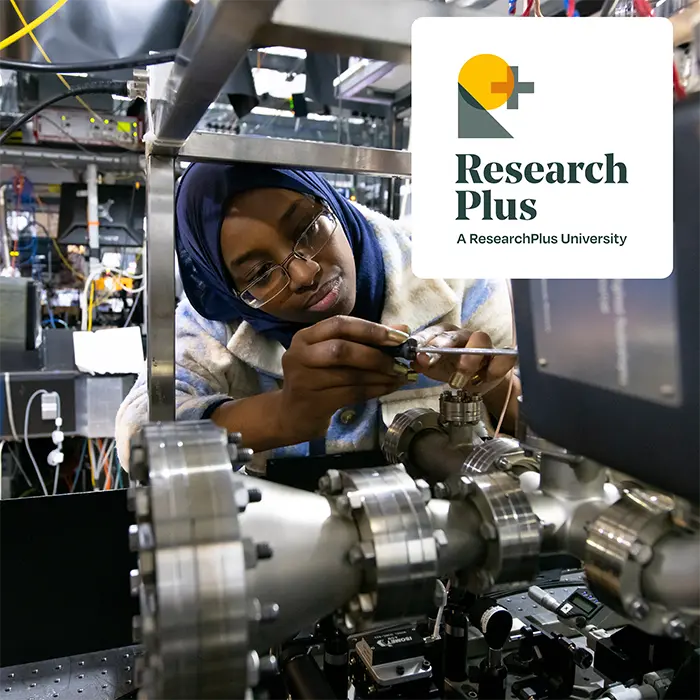
Modules
This is a single-honours course, allowing you to focus in depth on your core subject. Find out more from our guide to undergraduate study
-
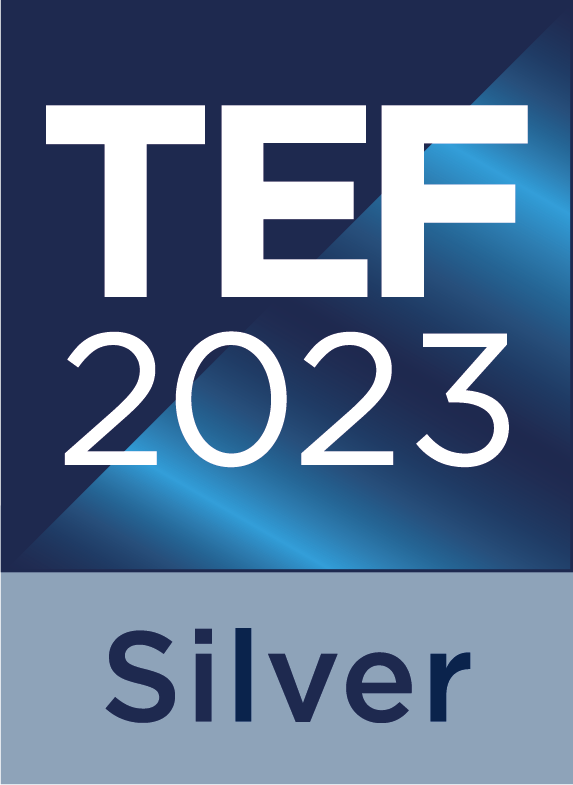 Silver
The student experience and student outcomes are typically very high quality.
Silver
The student experience and student outcomes are typically very high quality.
This rating was awarded in 2023, for four years. (Teaching Excellence Framework 2023)
Find out more about our approach to teaching and supporting you to thrive
-
Year 1 at Sussex
Your modules
Core modules
Core modules are taken by all students on the course. They give you a solid grounding in your chosen subject and prepare you to explore the topics that interest you most.
Autumn teaching
- Foundations of Data Analysis
- Introduction to Quantum Physics
- Mathematical Methods for Physics 1
- Mechanics
- Physics Study Success
Spring teaching
- Heat and Modern Physics
- Mathematical Methods for Physics 2
- Physics Year 1 Laboratory
- Waves and Fields
Your degree
In your first year, you’ll explore classical and modern physics. You’ll build on your mathematics skills to solve problems in physics and find out about the coding language Python. You’ll also explore current research in quantum technology and future frontiers.
Teaching
Teaching methods typically include:
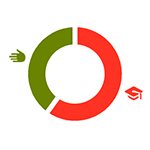
60%: Lecture
40%: Practical
Assessment
Assessment methods typically include coursework and examination.
Contact hours and workload
This year of study includes approximately 1,200 hours of work. This breaks down into about 420 hours of contact time and about 780 hours of independent study.
Engage and actively participate throughout your studies to get the most out of your course.
-
Year 2 at Sussex
Your modules
Core modules
Core modules are taken by all students on the course. They give you a solid grounding in your chosen subject and prepare you to explore the topics that interest you most.
Autumn teaching
- Applying Physics Skills
- Electrodynamics
- Mathematical Methods for Physics 3
- Physics Year 2 Laboratory
Spring teaching
Options
Alongside your core modules, you can choose options to broaden your horizons and tailor your course to your interests. This list gives you a flavour of our options, which are kept under review and may change, for example in response to student feedback or the latest research.
While it’s our aim for students to take their preferred combinations of options, this can’t be guaranteed and will be subject to timetabling. Options may be grouped and if so, students will be able to choose a set number of options from the selection available in any particular group.
Spring teaching
Your degree
In Year 2, you’ll build on the knowledge gained in your first year. You’ll develop a more advanced understanding of the principles and techniques needed for quantum technologies. Putting theory into practice, you’ll gain deeper theoretical skills and carry out more advanced experiments.
Teaching
Teaching methods typically include:

50%: Lecture
20%: Seminar
30%: Practical
Assessment
Assessment methods typically include coursework and examination.
Contact hours and workload
This year of study includes approximately 1,200 hours of work. This breaks down into about 320 hours of contact time and about 880 hours of independent study.
Engage and actively participate throughout your studies to get the most out of your course.
-
Year 3 at Sussex
Your modules
Core modules
Core modules are taken by all students on the course. They give you a solid grounding in your chosen subject and prepare you to explore the topics that interest you most.
Autumn teaching
Spring teaching
Options
Alongside your core modules, you can choose options to broaden your horizons and tailor your course to your interests. This list gives you a flavour of our options, which are kept under review and may change, for example in response to student feedback or the latest research.
While it’s our aim for students to take their preferred combinations of options, this can’t be guaranteed and will be subject to timetabling. Options may be grouped and if so, students will be able to choose a set number of options from the selection available in any particular group.
Spring teaching
Your degree
In Year 3, you’ll master core topics in physics and explore how they can be applied to quantum technologies.
Teaching
Teaching methods typically include:
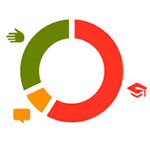
59%: Lecture
9%: Seminar
32%: Practical
Assessment
Assessment methods typically include coursework and examination.
Contact hours and workload
This year of study includes approximately 1,200 hours of work. This breaks down into about 420 hours of contact time and about 780 hours of independent study.
Engage and actively participate throughout your studies to get the most out of your course.
-
Year 4 at Sussex
Your modules
Core modules
Core modules are taken by all students on the course. They give you a solid grounding in your chosen subject and prepare you to explore the topics that interest you most.
Autumn teaching
Autumn and spring teaching
Spring teaching
Options
Alongside your core modules, you can choose options to broaden your horizons and tailor your course to your interests. This list gives you a flavour of our options, which are kept under review and may change, for example in response to student feedback or the latest research.
While it’s our aim for students to take their preferred combinations of options, this can’t be guaranteed and will be subject to timetabling. Options may be grouped and if so, students will be able to choose a set number of options from the selection available in any particular group.
Autumn teaching
- Advanced Materials for Sustainable Energy
- Atom Light Interactions
- Data Analysis Techniques
- Quantum Computing
- Quantum Field Theory
- Symmetry and the Standard Model
Spring teaching
- Advanced Quantum Field Theory
- Beyond the Standard Model
- Introduction to Nano-materials and Nano-characterisation
- Monte Carlo Simulations (L7)
Your degree
In your integrated Masters year, you’ll apply all the knowledge and experience gained so far to understand cutting-edge topics in quantum technologies. As part of your research project, you’ll carry out original research in quantum technologies.
Teaching
Teaching methods typically include:

52%: Lecture
48%: Practical
Assessment
Assessment methods typically include coursework, examination, practical work and written assessment.
Contact hours and workload
This year of study includes approximately 1,200 hours of work. This breaks down into about 300 hours of contact time and about 900 hours of independent study.
Engage and actively participate throughout your studies to get the most out of your course.
Spirit of Sussex Award
Feel involved in life at the University, make friends and enrich your experience with us – the Spirit of Sussex Award is our way of recognising your extracurricular and voluntary achievements.
-
Video transcript
Hi everyone! As I'm sure you've all heard by now, the Spirit of Sussex Award is now live.
Students across the Sussex community are already earning their points
What will you do to earn yours?
There's so many ways to get involved.
Head over to the website to start your Spirit of Sussex journey.
Text: The Spirit of Sussex Award is an exciting new programme designed to recognise and celebrate the things you do outside your course.
Participating in the Award makes it easy and fun for you to get involved and make the most of university life.
We regularly review our modules to incorporate student feedback, staff expertise, as well as the latest research and teaching methodology. We’re planning to run these modules in the academic year 2026/27. However, there may be changes to these modules in response to feedback, staff availability, student demand or updates to our curriculum. We’ll make sure to let you know of any material changes to modules at the earliest opportunity.
We’ll do our best to provide as much optional choice as we can, but timetabling constraints mean it may not be possible to take some module combinations. The structure of a small number of courses means that the order of modules or the streams you choose may determine whether modules are core or optional. This means that your core modules or options may differ from what’s shown here.
Check back in January 2027 for more details of the modules running in the academic year 2027/28.
Creating the right teaching environment makes an enormous difference to students’ education.”Sebastian Weidt
Professor of Quantum Computing and Entrepreneurship
Co-founder and CEO of quantum computing company Universal Quantum
Read Sebastian’s story
Our experts
Quantum technology transforms the world in seemingly impossible ways. On this course, you’ll learn from leading experts so you’re prepared to help shape the future of quantum research, applications and industry.”Professor Jacob Dunningham
Professor of Physics
The Department of Physics and Astronomy is a friendly hive of activity. You’ll join a close-knit community. Our open-door policy means that whatever you need, we’ll be there to support you.
Dr Jacqueline De Beaudrap
Assistant Professor in Theoretical Computer Science
Careers
- 86% of Sussex undergraduates have completed work experience by the end of their course (University of Sussex Career Readiness data at point of graduation 2023/24)
During your studies, you’ll get careers and CV advice. With careers fairs, forums and a dedicated careers officer, we support your career development from day one. You’ll have opportunities to meet potential employers.
In the Department of Physics and Astronomy, you’ll have a wide range of paid work opportunities. This ranges from teaching and research opportunities in the summer, to outreach roles throughout the year. We are a core part of the SEPnet (South East Physics Network) consortium, which gives us links to universities and industries across the region.
On graduation, you’ll have the range of versatile and technical skills required by employers. You’ll be well prepared for a variety of technical and management roles in the quantum technology sector. You could also choose to progress into roles in:
- research and academia
- finance
- teaching
- consulting.
Where do our graduates work now?
Surveyed 15 months after finishing their courses, our recent graduates from the Department of Physics and Astronomy worked for employers including:
- Babcock
- EDF
- Frenetic
- KPMG
- National Physical Laboratory
- NHS
- Transport for Greater Manchester
- Deloitte
- BAE Systems.
(Graduate Outcomes Survey 2017-2022)
Working while you study
Our Careers and Entrepreneurship team can help you find part-time work while you study. Find out more about career development and part-time work
Design your future at Sussex
Taking the next step in your career can feel daunting, but we’ll help you to explore, connect and flourish throughout your studies and beyond.
As a Sussex student, you’ll learn how to tackle real-world challenges and have access to tailored programmes of careers support:
- our Career Lab helps you to explore your options, build key skills and connect with employers. Take part in internships, community consultancy projects and insight visits, where you can learn about life at organisations including Brighton & Hove Albion Football Club, Gatwick Airport and the Knepp Rewilding Project
- one-to-one appointments with your Faculty Careers Consultant can enable you to identify your career goals, write an effective CV and prepare for future interviews
- entrepreneurship initiatives like StartUp Sussex and Ideas Lab can empower you to turn your concepts into reality.
Explore how our Careers and Entrepreneurship team can support you
-
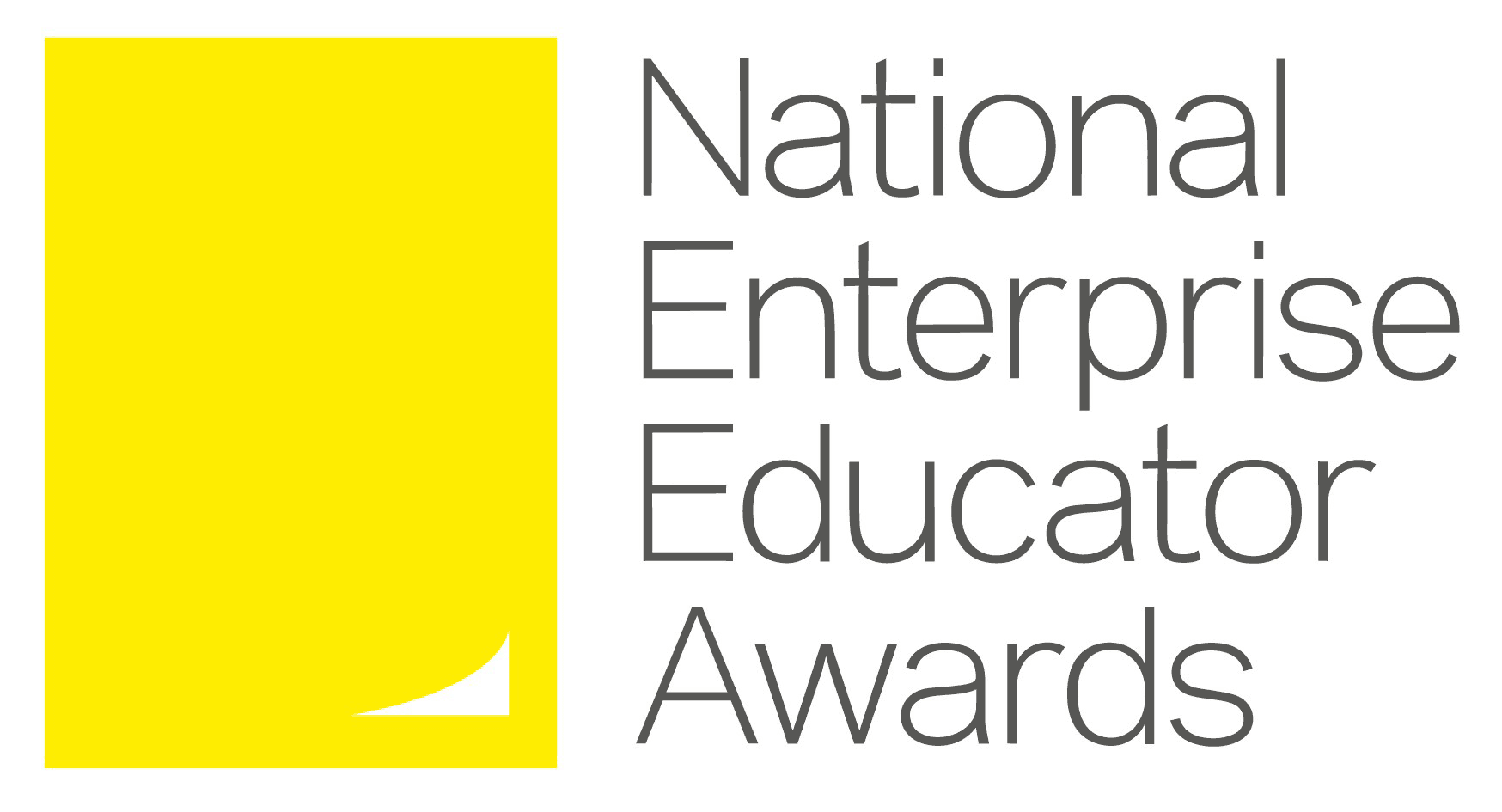 Winner
Entrepreneurship Catalyst Award
National Enterprise Educator Awards 2024
Winner
Entrepreneurship Catalyst Award
National Enterprise Educator Awards 2024
-
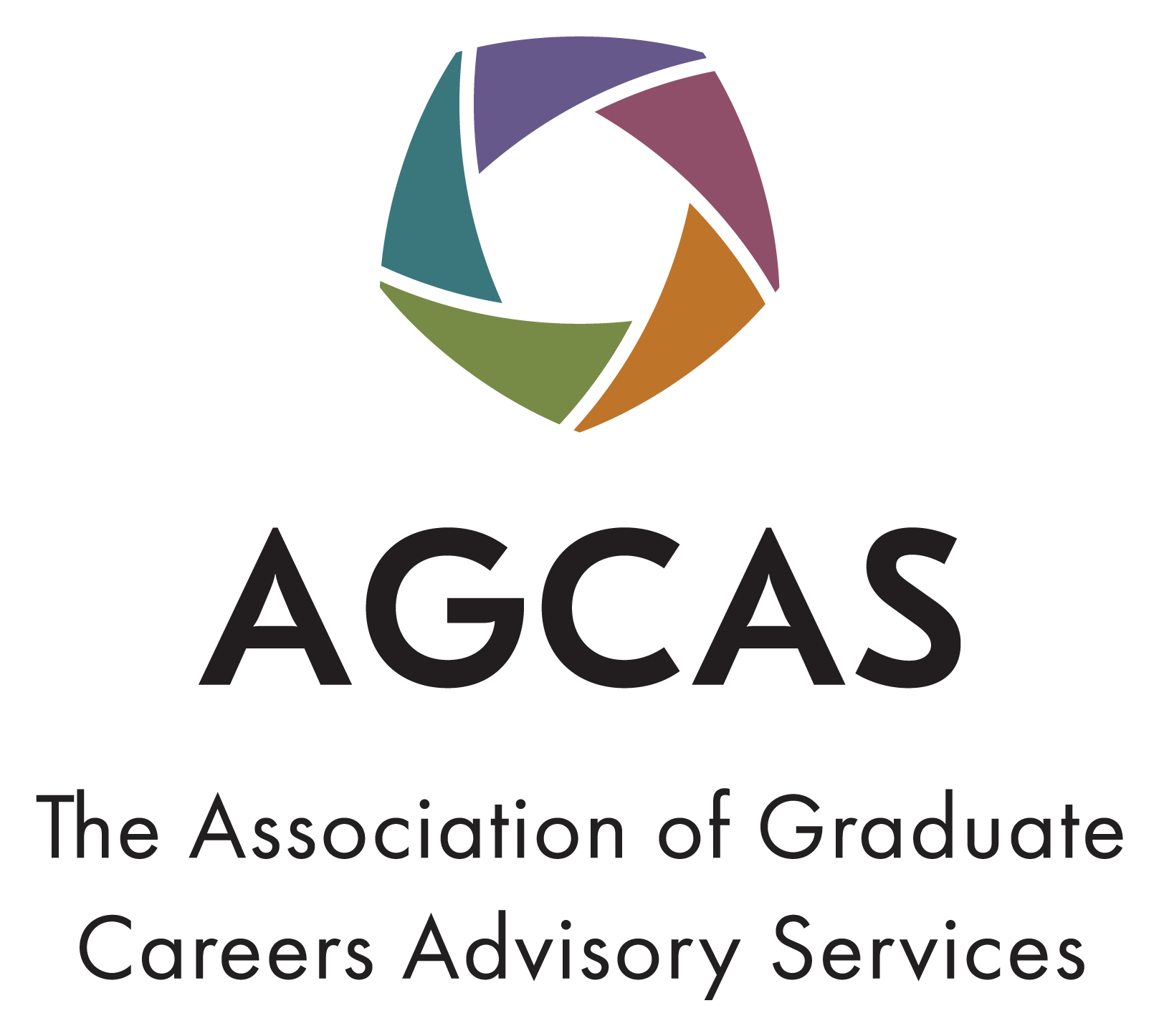 Winner
Supporting Student and Graduate Employability Award
AGCAS Awards for Excellence 2024
Winner
Supporting Student and Graduate Employability Award
AGCAS Awards for Excellence 2024
-
 Top 50
Best Universities for Work Experience in the UK
2025 Higherin Awards
Top 50
Best Universities for Work Experience in the UK
2025 Higherin Awards
Entry requirements
A-level
| Typical offer | AAA |
|---|---|
| Contextual offer | View contextual offer Not everyone has the same support to get to higher education – we help you reach your potential. When we receive applications through UCAS, we consider all factors and will sometimes make contextual offers as part of our Access and Participation Plan |
| Subjects | A-levels must include Mathematics and Physics.
|
| GCSEs | You should have a broad range of GCSEs 9-4 (A*-C), including good grades in relevant subjects. |
| Extended Project Qualification | We take the EPQ into account when considering your application and it can be useful in the summer when your results are released if you have narrowly missed the conditions of your offer. We do not routinely include the EPQ in the conditions of your offer but we sometimes offer alternative conditions that include the EPQ. If you wish to discuss this further please contact us |
Additional UK qualifications
Access to HE Diploma
| Subjects |
|
|---|
Cambridge Pre-U Principal Subjects (including A-level mixes)
| Typical offer | D3, D3, M2 If you have one A-level and two Cambridge Pre-U Principal Subjects we would expect you to have a grade A* in the A-level, and D3 in the two Pre-Us. If you have two A-levels and a Cambridge Pre-U Principal Subject we would normally expect you to have grades A*A in 2 A-levels and D3 in the Pre-U. |
|---|---|
| Subjects | You must have either Mathematics at A-level and Physics or as a Cambridge Pre-U Principal subjects.
|
| GCSEs | You should have a broad range of GCSEs grade 9-4 (A*-C), including good grades in relevant subjects. |
International Baccalaureate
| Typical offer | 36 points overall from the full IB Diploma. |
|---|---|
| Subjects | Higher Levels must include Mathematics and Higher level Physics with a grade of 7. For entry, either Mathematics: Analysis and Approaches or Mathematics: Applications and Interpretation at Higher Level will be accepted.
|
Pearson BTEC Level 3 National Extended Certificate and two A-levels
| Typical offer | Grades AA in A-levels plus Distinction in BTEC Level 3 National Extended Certificate. |
|---|---|
| Subjects | A-levels must include Mathematics and Physics. |
| GCSEs | You should have a broad range of GCSEs 9-4 (A*-C), including good grades in relevant subjects. |
Scottish Highers
| Typical offer | AAAAA |
|---|---|
| Subjects | Highers must include both Mathematics and Physics. You will also need Advanced Highers in both Mathematics and Physics (grade A). |
Welsh Baccalaureate Advanced
| Typical offer | AAA from the Advanced Welsh Baccalaureate Skills Challenge Certificate and two A-levels
|
|---|---|
| Subjects | A-levels must include Mathematics and Physics. |
| GCSEs | You should have a broad range of GCSEs A*-C (9-4), including good grades in relevant subjects. |
International Baccalaureate
| Typical offer | 36 points overall from the full IB Diploma. |
|---|---|
| Subjects | Higher Levels must include Mathematics and Higher level Physics with a grade of 7. For entry, either Mathematics: Analysis and Approaches or Mathematics: Applications and Interpretation at Higher Level will be accepted.
|
European Baccalaureate
| Typical offer | Overall result of at least 83% |
|---|---|
| Additional requirements | Evidence of existing academic ability in Mathematics and Higher level Physics. is essential (normally with a final grade of at least 8.5). |
Additional international qualifications
Australia
| Typical offer | Relevant state (Year 12) High School Certificate, and a score of 95% in the ATAR or UAI/TER/ENTER, or a Queensland OP of 2 or better.
|
|---|---|
| Additional requirements | Evidence of existing academic ability to a high level in Mathematics and Physics is essential. Our entry requirements are guidelines and we assess all applications on a case-by-case basis. |
Austria
| Typical offer | Reifeprüfung or Matura with an overall result of 1.6 for first-year entry. |
|---|---|
| Additional requirements | Evidence of existing academic ability to a high level in Mathematics and Physics is essential. Our entry requirements are guidelines and we assess all applications on a case-by-case basis. |
Belgium
| Typical offer | Certificat d'Enseignement Secondaire Supérieur (CESS) or Diploma van Hoger Secundair Onderwijs with a good overall average. |
|---|---|
| Subject-specific knowledge | Evidence of existing academic ability in both Mathematics and Physics is essential. |
| Please note | Our entry requirements are guidelines and we assess all applications on a case-by-case basis. |
Bulgaria
| Typical offer | Diploma za Sredno Obrazovanie with excellent final-year scores (normally 5.5 overall with 6 in key subjects). |
|---|---|
| Subject-specific knowledge | Evidence of existing academic ability in both Mathematics and Physics is essential. |
| Please note | Our entry requirements are guidelines and we assess all applications on a case-by-case basis. |
Canada
| Typical offer | Ontario Secondary School Diploma (OSSD) 80% from 6 grade 12 U, U/C or M courses |
|---|---|
| Additional requirements | Evidence of existing academic ability to a high level in Mathematics and Physics is essential. Our entry requirements are guidelines and we assess all applications on a case-by-case basis. |
China
| Typical offer | If you have the Goakao, we will consider applications for direct entry to first year. You would normally need an overall average of 75%, including required subjects. We are also pleased to consider applications if you are following a recognised International Foundation Year or you have one or more years of Higher Education in China at a recognised degree awarding institution. The Senior High School Graduation alone would not be sufficient for entry to our undergraduate degrees, but you may be eligible to apply for our International Foundation Year. If you successfully complete an International Foundation Year, you can progress on to a relevant undergraduate course at Sussex. Check which qualifications the International Study Centre accepts for the International Foundation Year. |
|---|---|
| Subject-specific knowledge | Evidence of existing academic ability in both Mathematics and Physics is essential. |
| Please note | Our entry requirements are guidelines and we assess all applications on a case-by-case basis. |
Croatia
| Typical offer | Maturatna Svjedodžba with an overall score of at least 5. |
|---|---|
| Additional requirements | Evidence of existing academic ability to a high level in Mathematics and Physics is essential. Our entry requirements are guidelines and we assess all applications on a case-by-case basis. |
Cyprus
| Typical offer | Apolytirion of Lykeion with an overall average of 19/20 and above will be considered for first-year entry. |
|---|---|
| Additional requirements | Evidence of existing academic ability to a high level in Mathematics and Physics is essential. Our entry requirements are guidelines and we assess all applications on a case-by-case basis. |
Czech Republic
| Typical offer | Maturita with a good overall average. |
|---|---|
| Subject-specific knowledge | Evidence of existing academic ability in both Mathematics and Physics is essential. |
| Please note | Our entry requirements are guidelines and we assess all applications on a case-by-case basis. |
Denmark
| Typical offer | Højere Forberedelseseksamen (HF) or Studentereksamen with an overall average of at least 10 on the new grading scale. |
|---|---|
| Additional requirements | Evidence of existing academic ability to a high level in Mathematics and Physics is essential. Our entry requirements are guidelines and we assess all applications on a case-by-case basis. |
Finland
| Typical offer | Pass Ylioppilastutkinto with overall final result of at least EEEM |
|---|---|
| Additional requirements | Evidence of existing academic ability to a high level in Mathematics and Physics is essential. Our entry requirements are guidelines and we assess all applications on a case-by-case basis. |
France
| Typical offer | French Baccalauréat with an overall final result of 15/20. |
|---|---|
| Additional requirements | You will need to be taking the science strand within the French Baccalaureat with a final result of at least 14/20 in Mathematics and Physics. Our entry requirements are guidelines and we assess all applications on a case-by-case basis. |
Germany
| Typical offer | German Abitur with an overall result of 1.6. |
|---|---|
| Additional requirements | You will need to achieve a final mark of at least 14/15 in Mathematics and Physics. Our entry requirements are guidelines and we assess all applications on a case-by-case basis. |
Greece
| Typical offer | Apolytirion with an overall average of at least 19.5 will be considered for first-year entry. You must also have either Apolytirion pathway in Mathematics and Physics with a score of 20 or the Pan Hellenic in Mathematics and Physics with an overall score of 18. |
|---|---|
| Additional requirements | Our entry requirements are guidelines and we assess all applications on a case-by-case basis. |
Hong Kong
| Typical offer | Hong Kong Diploma of Secondary Education (HKDSE) with grades of 5, 5, 5 from three subjects including two electives |
|---|---|
| Additional requirements | Evidence of existing academic ability to a high level in Mathematics and Physics is essential. Our entry requirements are guidelines and we assess all applications on a case-by-case basis. |
Hungary
| Typical offer | Erettsegi/Matura with a good average of at least 55555. |
|---|---|
| Additional requirements | Evidence of existing academic ability to a high level in Mathematics and Physics is essential. Our entry requirements are guidelines and we assess all applications on a case-by-case basis. |
India
| Typical offer | Standard XII results for entry into 1st year (depending on board and course choice):
We will also consider students for entry into our integrated foundation years with 60+% |
|---|---|
| Additional requirements | Evidence of existing academic ability to a high level in Mathematics and Physics is essential. Our entry requirements are guidelines and we assess all applications on a case-by-case basis. |
Iran
| Typical offer | Where direct entry is unsuitable, we'll automatically consider you for one of our Foundation Years. Or you might want to apply to one of our International Foundation Years at the international Study Centre on Campus. Visit isc.sussex.ac.uk/our-courses/international-foundation-year or www.sussex.ac.uk/study/undergraduate/courses/foundation-years |
|---|---|
| Subject-specific knowledge | Evidence of existing academic ability in both Mathematics and Physics is essential. |
| Please note | Our entry requirements are guidelines and we assess all applications on a case-by-case basis. |
Ireland
| Typical offer | Irish Leaving Certificate (Higher Level) at H1,H1,H2,H2,H2. |
|---|---|
| Additional requirements | Highers must include Mathematics and Physics with a score of H1.
|
Israel
| Typical offer | Bagrut, with at least 8/10 in at least six subjects, including one five-unit subject. |
|---|---|
| Subject-specific knowledge | Evidence of existing academic ability in both Mathematics and Physics is essential. |
| Please note | Our entry requirements are guidelines and we assess all applications on a case-by-case basis. |
Italy
| Typical offer | Italian Diploma Di Maturità or Diploma Pass Di Esame Di Stato with a final Diploma mark of 90/100. |
|---|---|
| Additional requirements | Evidence of existing academic ability to a high level in Mathematics and Physics is essential. Our entry requirements are guidelines and we assess all applications on a case-by-case basis. |
Japan
| Typical offer | Where direct entry is unsuitable, we'll automatically consider you for one of our Foundation Years. Or you might want to apply to one of our International Foundation Years at the international Study Centre on Campus. Visit isc.sussex.ac.uk/our-courses/international-foundation-year or www.sussex.ac.uk/study/undergraduate/courses/foundation-years |
|---|---|
| Subject-specific knowledge | Evidence of existing academic ability in both Mathematics and Physics is essential. |
| Please note | Our entry requirements are guidelines and we assess all applications on a case-by-case basis. |
Kazakhstan
| Typical offer | Applicants with Nazarbayev Intellectuals Schools (NIS) Grade 12 Certificate may be considered. The grades in the offer will match the published A level requirements for each course. |
|---|---|
| Additional requirements | Where courses have specific subject requirements, these will be expected to be studied at Advanced level. |
| Subject-specific knowledge | Evidence of existing academic ability in both Mathematics and Physics is essential. |
| Please note | Our entry requirements are guidelines and we assess all applications on a case-by-case basis. |
Latvia
| Typical offer | Atestats par Visparejo videjo Izglitibu with very good grades in state exams. |
|---|---|
| Subject-specific knowledge | Evidence of existing academic ability in both Mathematics and Physics is essential. |
| Please note | Our entry requirements are guidelines and we assess all applications on a case-by-case basis. |
Lithuania
| Typical offer | Brandos Atestatas including scores of 80-90% in at least three state examinations (other than English). |
|---|---|
| Subject-specific knowledge | Evidence of existing academic ability in both Mathematics and Physics is essential. |
| Please note | Our entry requirements are guidelines and we assess all applications on a case-by-case basis. |
Luxembourg
| Typical offer | Pass the Diplome de Fin d’Etudes Secondaires with 48 points overall |
|---|---|
| Additional requirements | Evidence of existing academic ability to a high level in Mathematics and Physics is essential. Our entry requirements are guidelines and we assess all applications on a case-by-case basis. |
Malaysia
| Typical offer | at least Sijil Tinggi Persekolahan Malaysia (STPM) with grades of BBB, Matriculation with a least a grade of 3.0 or UEC with an overall average grade B4 (70%) from 6 subjects. |
|---|---|
| Additional requirements | Evidence of existing academic ability to a high level in Mathematics and Physics is essential. Our entry requirements are guidelines and we assess all applications on a case-by-case basis. |
Netherlands
| Typical offer | Voorereidend Wetenschappelijk Onderwijs (VWO), normally with an average of at least 7. |
|---|---|
| Subject-specific knowledge | Evidence of existing academic ability in both Mathematics and Physics is essential. |
| Please note | Our entry requirements are guidelines and we assess all applications on a case-by-case basis. |
Nigeria
| Typical offer | You are expected to have one of the following:
You must also have a score of C6 or above in WAEC/SSC English. Where direct entry is unsuitable, we'll automatically consider you for one of our Foundation Years. Or you might want to apply to one of our International Foundation Years at the international Study Centre on Campus. Visit isc.sussex.ac.uk/our-courses/international-foundation-year or www.sussex.ac.uk/study/undergraduate/courses/foundation-years |
|---|---|
| Subject-specific knowledge | Evidence of existing academic ability in both Mathematics and Physics is essential. |
| Please note | Our entry requirements are guidelines and we assess all applications on a case-by-case basis. |
Norway
| Typical offer | Norwegian Vitnemal Fra Den Videregaende Opplaering - Pass with an overall average of 5 |
|---|---|
| Additional requirements | Evidence of existing academic ability to a high level in Mathematics and Physics is essential. Our entry requirements are guidelines and we assess all applications on a case-by-case basis. |
Pakistan
| Typical offer | You can apply for direct entry to Year 1 if you are completing at least two years of Bachelor degree studies. You'll normally need to complete a Foundation year after taking Intermediate Certificate or the Higher Secondary Certificate (HSC). You might choose one of our International Foundation Years at the International Study Centre on campus. |
|---|---|
| Additional requirements | Evidence of existing academic ability to a high level in Mathematics and Physics is essential. Our entry requirements are guidelines and we assess all applications on a case-by-case basis. |
Poland
| Typical offer | Pass Matura with least 3 Extended level subjects including Mathematics and Physics in the 85th percentile.
|
|---|---|
| Additional requirements | Our entry requirements are guidelines and we assess all applications on a case-by-case basis. |
Portugal
| Typical offer | Diploma de Ensino Secundario normally with an overall mark of 19/20. |
|---|---|
| Additional requirements | Evidence of existing academic ability to a high level in Mathematics and Physics is essential. Our entry requirements are guidelines and we assess all applications on a case-by-case basis. |
Romania
| Typical offer | Diploma de Bacalaureat with an overall average of between 9.0 including a score of 9 in Mathematics and Physics |
|---|---|
| Additional requirements |
Our entry requirements are guidelines and we assess all applications on a case-by-case basis. |
Russia
| Typical offer | Applicants who have good grades in the Attestat o Srednem Obrazovami (Certificate of Secondary Education) and who have successfully completed the first year of a Russian University degree, with a minimum GPA of 4.0, will be considered for admission to the first year of our bachelor’s degree courses. |
|---|---|
| Subject-specific knowledge | Evidence of existing academic ability in both Mathematics and Physics is essential. |
| Please note | Our entry requirements are guidelines and we assess all applications on a case-by-case basis. |
Singapore
| Typical offer | A-levels, as well as certain certificates and diplomas. |
|---|---|
| Subject-specific knowledge | Evidence of existing academic ability in both Mathematics and Physics is essential. |
| Please note | Our entry requirements are guidelines and we assess all applications on a case-by-case basis. |
Slovakia
| Typical offer | Pass Vysvedčenie o maturitnej skúške (Maturita) with an average grade of 1.2 from 4 subjects including Mathematics and Physics.
|
|---|---|
| Additional requirements | Our entry requirements are guidelines and we assess all applications on a case-by-case basis. |
Slovenia
| Typical offer | Secondary School Leaving Diploma or Matura with at least 26 points overall. |
|---|---|
| Additional requirements | Evidence of existing academic ability to a high level in Mathematics and Physics is essential. Our entry requirements are guidelines and we assess all applications on a case-by-case basis. |
South Africa
| Typical offer | National Senior Certificate with very good grades. |
|---|---|
| Subject-specific knowledge | Evidence of existing academic ability in both Mathematics and Physics is essential. |
| Please note | Our entry requirements are guidelines and we assess all applications on a case-by-case basis. |
Spain
| Typical offer | Spanish Título de Bachillerato (LOGSE) with an overall average result of at least 8.5. |
|---|---|
| Additional requirements | Evidence of existing academic ability to a high level in Mathematics and Physics is essential. Our entry requirements are guidelines and we assess all applications on a case-by-case basis. |
Sri Lanka
| Typical offer | Sri Lankan A-levels. |
|---|---|
| Subject-specific knowledge | Evidence of existing academic ability in both Mathematics and Physics is essential. |
| Please note | Our entry requirements are guidelines and we assess all applications on a case-by-case basis. |
Sweden
| Typical offer | Fullstandigt Slutbetyg/Högskoleförberedande Examen with a total of 2,500 credits to include A and B grades in the majority of subjects and to include grade A in Mathematics and Physics.
|
|---|---|
| Additional requirements | Our entry requirements are guidelines and we assess all applications on a case-by-case basis. |
Switzerland
| Typical offer | Federal Maturity Certificate. |
|---|---|
| Subject-specific knowledge | Evidence of existing academic ability in both Mathematics and Physics is essential. |
| Please note | Our entry requirements are guidelines and we assess all applications on a case-by-case basis. |
Turkey
| Typical offer | We'll consider students who have taken the Lise Diplomasi or Lise Bitirme, with a score of at least 4/5 or 80/100 in their final year, on a case by case basis for direct entry to year 1. Where direct entry is unsuitable, we'll automatically consider you for one of our Foundation Years. Or you might want to apply to one of our International Foundation Years at the international Study Centre on Campus. Visit isc.sussex.ac.uk/our-courses/international-foundation-year or www.sussex.ac.uk/study/undergraduate/courses/foundation-years |
|---|---|
| Additional requirements | Evidence of existing academic ability to a high level in Mathematics and Physics is essential. Our entry requirements are guidelines and we assess all applications on a case-by-case basis. |
USA
| Typical offer | We look at your full profile taking into account everything you are studying, including the high school graduation diploma, Grade 12 GPA, SAT tests and/or ACT grades We are particularly interested in AP tests and would ideally like to see three good AP scores
|
|---|---|
| Additional requirements | Evidence of existing academic ability to a high level in Mathematics and Physics is essential. Our entry requirements are guidelines and we assess all applications on a case-by-case basis. |
My country is not listed
If your qualifications aren’t listed or you have a question about entry requirements, contact us
English language requirements
IELTS (Academic)
6.0 overall, including at least 5.5 in each component
Check your IELTS qualification meets all of our language requirements
IELTS scores are valid for two years from the test date. You cannot combine scores from more than one sitting of the test. Your score must be valid when you begin your Sussex course.
We accept IELTS One Skills Retake.
Other English language requirements
Proficiency tests
Cambridge Advanced Certificate in English (CAE)
169 overall, including at least 162 in each skill
Find out more about Cambridge English: Advanced.
We would normally expect the CAE test to have been taken within two years before the start of your course.
You cannot combine scores from more than one sitting of the test.
Cambridge Certificate of Proficiency in English (CPE)
169 overall, including at least 162 in each skill
Find out more about Cambridge English: Proficiency.
We would normally expect the CPE test to have been taken within two years before the start of your course.
You cannot combine scores from more than one sitting of the test.
Pearson (PTE Academic)
59 overall, including at least 59 in all four skills.
Check your Pearson (PTE Academic) qualification meets all of our language requirements
Find out more about Pearson (PTE Academic).
Please refer to our English language requirements above, and as listed for each of our undergraduate courses, to find the appropriate English level for the course you are applying for.
PTE (Academic) scores are valid for two years from the test date. You cannot combine scores from more than one sitting of the test. Your score must be valid when you begin your Sussex course.
We do not accept the PTE Academic Online test.
TOEFL (iBT)
80 overall, including at least 17 in Listening, 18 in Reading, 20 in Speaking, 17 in Writing.
Check your TOEFL qualification meets all of our language requirements
Find out more about TOEFL (iBT).
TOEFL (iBT) scores are valid for two years from the test date. You cannot combine scores from more than one sitting of the test. Your score must be valid when you begin your Sussex course.
The TOEFL Institution Code for the University of Sussex is 9166.
English language qualifications
AS/A-level (GCE)
Grade C or above in English Language.
Hong Kong Advanced Level Examination (HKALE)/ AS or A Level: grade C or above in Use of English
GCE O-level
Grade C or above in English.
Brunei/Cambridge GCE O-level in English: grades 1-6.
Singapore/Cambridge GCE O-level in English: grades 1-6.
GCSE or IGCSE
Grade C or above in English as a First Language (grade 4 or above in GCSE from 2017).
Grade B or above in English as a Second Language (grade 6 or above in GCSE from 2017).
Ghana Senior Secondary School Certificate
If awarded before 1993: grades 1-6 in English language.
If awarded between 1993 and 2005: grades A-D in English language.
Hong Kong Diploma of Secondary Education (HKDSE)
Level 4, including at least 3 in each component in English Language.
Indian School Certificate (Standard XII)
The Indian School Certificate is accepted at the grades below when awarded by the following examination boards:
Central Board of Secondary Education (CBSE) – English Core only: 70%
Council for Indian School Certificate Examinations (CISCE) - English: 70% or Grade 3
International Baccalaureate Diploma (IB)
English A or English B at grade 5 or above.
Kenya Certificate of Secondary Education
Grades A – C in English
Malaysian Certificate of Education (SPM) 119/GCE O-level
If taken before the end of 2008: grades 1-5 in English Language.
If taken from 2009 onwards: grade C or above in English Language.
The qualification must be jointly awarded by the University of Cambridge Local Examinations Syndicate (UCLES).
West African Senior School Certificate
Grades 1-6 in English language when awarded by the West African Examinations Council (WAEC) or the National Examinations Council (NECO).
Country exceptions
Select to see the list of exempt English-speaking countries
If you are a national of one of the countries below, or if you have recently completed a qualification equivalent to a UK Bachelors degree or higher in one of these countries, you will normally meet our English requirements. Note that qualifications obtained by distance learning or awarded by studying outside these countries cannot be accepted for English language purposes.
You will normally be expected to have completed the qualification within two years before starting your course at Sussex. If the qualification was obtained earlier than this we would expect you to be able to demonstrate that you have maintained a good level of English, for example by living in an English-speaking country or working in an occupation that required you to use English regularly and to a high level.
Please note that this list is determined by the UK’s Home Office, not by the University of Sussex.
List of exempt countries
- Antigua and Barbuda
- Australia
- Bahamas
- Barbados
- Belize
- Canada**
- Dominica
- Grenada
- Guyana
- Ireland
- Jamaica
- New Zealand
- St Kitts and Nevis
- St Lucia
- St Vincent and the Grenadines
- Trinidad and Tobago
- United Kingdom
- USA
** Canada: you must be a national of Canada; other nationals not on this list who have a degree from a Canadian institution will not normally be exempt from needing to provide evidence of English.
English language support
If you don’t meet the English language requirements for your degree, you may be able to take a pre-sessional course
Additional admissions information
| Academic Technology Approval Scheme (ATAS) for international students | |
|---|---|
| Transfers into Year 2 | Yes. Find out more about transferring into Year 2 of this course. We don’t accept transfers into the third or final year. |
If your qualifications aren’t listed or you have a question about entry requirements, contact us
Fees
Fees are not yet set for the academic year 2027/28 – please check back in September 2026. Note that your fees, once they’re set, may be subject to an increase on an annual basis.
Living costs
We know the rising cost of living is on everyone’s mind, and affects us all in different ways. Our guide to living costs has been designed to help you plan and budget for life as a Sussex student.
Learn more about typical living costs
Scholarships
Details of our scholarships are not yet set for entry in the academic year 2027/28.
Contact us
Ask a student
Chat to Sussex students online via the UniBuddy chat platform.
Prospectus
What do you want to do next?
Legal information
We understand that deciding where and what to study is a very important decision. We’ll make all reasonable efforts to provide you with the courses, services and facilities described in this prospectus. However, if we need to make material changes, for example due to government or regulatory requirements, or unanticipated staff changes, we’ll let you know as soon as possible.
A-level - contextual offer
AAA
